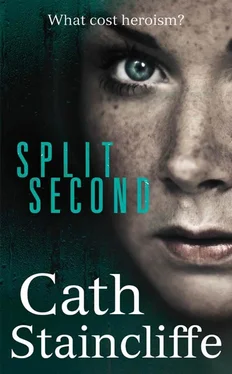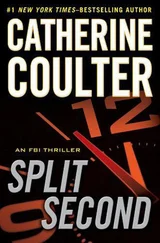Her mum was shocked; she’d seen all about it on the news. She wanted to know if they’d caught anyone. Emma told her no.
‘It’s awful, that,’ her mum said. ‘He was from a good family and everything. It was right outside his house. Oh, Emma, I never liked you being in Manchester, and now this.’
Her dad snorted. ‘It’s everywhere these days, woman. And if you do have a go, half the time it’s you’ll get arrested. Charged with assault. People screaming human rights, never mind who the bad guy is. What rights did that student have?’
‘Disgraceful,’ her mother agreed. ‘Ted, next door but one, saw some kids knocking over wheelie bins, making a right mess. He rang the police, and do you know what they said? They didn’t have the resources to send anyone round, but if Ted wanted to, he could go down to the station and make a complaint. We’re thinking of setting up a Home Watch.’
‘Improve your house and contents premiums,’ Emma, on safer ground, told them.
They watched a documentary about rogue builders; it was shocking, it really was. Emma couldn’t stay awake any longer. Mum told her to take some paracetamol and drink some orange juice.
She slept fitfully. Her throat felt like she was gargling ground glass; she was sweating and throwing the duvet off, then she’d get really cold and shivery. She couldn’t stop coughing and spluttering, and she felt like someone had stuffed her head with sand.
Christmas Day was just like every year: drinks before lunch, presents after. All done in time for the Queen’s speech.
Emma talked to them about her work and told them that her last appraisal had been the best yet but there was a freeze on pay rises at the moment because of the financial situation. That set Dad off on his soapbox about government spending and benefit cheats, until Mum asked him to change the record. But she said it in a nice way, laughing, and he didn’t jump down her throat.
On Boxing Day they always went to her aunt and uncle’s. They had a bigger house and her nan lived with them now. They’d made the dining room into a bedroom for her and put in a downstairs shower. Nan was much worse. She kept calling Emma Claire. Emma hadn’t a clue who Claire was until Mum explained she had been Nan’s sister and died in her twenties of complications after an operation. Nan’s teeth had mostly gone and she had new hearing aids that made a swooping, whistling noise that set Emma’s teeth on edge.
Her auntie wasn’t any great shakes as a cook: the beef was leathery and the Christmas pud, which she did in the microwave – ‘Do you remember they used to take forever on the stove?’ – was so tiny they got like a teaspoon each with lumpy brandy sauce.
Emma’s uncle got a bit drunk and wanted to show them a DVD of a cruise they’d taken in the spring. Emma was glad when Nan became agitated and insisted they put the proper telly back on. Thank God they could leave early with Emma being poorly.
Her mum never said a word about Emma’s weight. Not once in all the time she was home. Usually she’d tell her she looked well or she was looking trimmer or even ask if she was still dieting. Emma took the silence as confirmation that what she’d suspected all year was true. She was still gaining. She just kept getting bigger, and nothing worked.
The two Kims were like straws, could eat anything and never put on weight. Laura was bigger but still only size 14. She would exercise more, Emma promised herself. She couldn’t afford a gym, but she would get into the habit of taking the train both ways to work and walking through town. She wasn’t going to just give up. And she’d have to be a lot bigger to qualify for gastric-band surgery. Meanwhile it was impossible not to eat over the holiday; the fridge was stuffed with food, so she just got on with it. Tucked in with the rest of them.
Andrew
Boxing Day and he found Val at the kitchen table, her chin on her hand, elbow propped, staring out to the back garden. Papers strewn about, Post-it notes and pens. It looked like she was preparing a report for work. She often brought work home, responsible for training across all the departments at the town hall. But he knew this current project was personal: the burial of their son.
‘Do you need a hand with that?’
She turned, took a breath like someone coming round from a sleep. Dragged herself into the present. The here and now. ‘No, it’s okay. Just think,’ she said, ‘they’re out there today, opening their presents, stuffing their faces, swigging-’ She broke off. ‘Do they think they can get away with it!’ Her face was mobile with emotion, her eyes burning. ‘How can they sleep? How can they function? The families must know.’
He thought of the figures in the garden, the lad rearing up and away from Jason. He rubbed at his face. ‘They’ll find them,’ he said. He went and stood behind her, put his hands on her shoulders, kissed the top of her head.
‘You okay if I go for a walk?’
‘Sure.’ She put her hand up to squeeze his.
His shoes were still soaked. He thought of the journey home on Christmas Eve, swigging the brandy, stepping in puddles.
Outside, the wind cut into his face, icy blasts that drove heavy, brass-tinted clouds across the sky. Frost glimmered on the fences and shrubs. Black ice gleamed malevolent on the tarmac.
He had no sense of where he was going, no route planned out. He just walked and walked until his body warmed and the aching in his limbs made him feel halfway alive.
The house was quiet on his return. On the table, Val’s lists. The bewildering range of things to do for Thursday. Val’s neat print marched in serried ranks down the page.
NURSERY – BUY TREE
TAKE WATERING CAN/SPADES
FELIX – FLUTE
REHEARSE BEARERS (COLIN, NICK,
HARRY, MARLON)
FEES FOR CELEBRANT
B &B DETAILS
BAR
DECOR FOR CC
She always made lists. Andrew remembered the long period of limbo waiting for Jason to come home from hospital. The first few weeks not knowing if he would or not. Val constantly refining the lists of clothing and equipment. Not daring to buy anything for long enough. Colin and Izzie had offered them plenty of baby gear, but they decided not to have it in the house until they knew for certain that Jason would pull through.
In the incubator they used special materials; ordinary fabric would have been intolerably harsh against his raw, fragile skin.
They watched him grow from a scrap of skin and bones and a flickering heart, the whole of him smaller than Andrew’s hand, to a young man with his dragon tattoo and muddy-blond tresses and lazy smile.
‘He’s so laid back, he’s horizontal,’ Val had complained one summer when she’d come in from work to find Jason, then fifteen, still in his pyjamas, scoffing cereal and playing on the games console. ‘Why won’t he get a job?’
‘He doesn’t need the money,’ Andrew suggested.
‘It’s not about the money,’ she said, ‘but the experience.’
‘What – working in a fast-food joint for crap wages?’ Andrew said. He was with Jason on this one.
‘He’d learn something. Customer service, how to operate a till. You worked when you were his age, didn’t you, at the golf club.’
‘Collecting glasses. Everyone worked back then. There were more jobs, less pocket money.’
‘That’s where we’ve gone wrong,’ she said darkly.
‘Hey.’ He put his arms around her waist, drew her close. ‘We’ve not gone wrong; he’s a lovely boy. Lazy as sin, but lovely with it.’
‘Well if he’s here all day, he can do more at home.’ And she’d followed through, leaving lists of chores, instructions for the washing machine, the hoovering, reminders about the dishwasher and tidying his room.
Читать дальше












